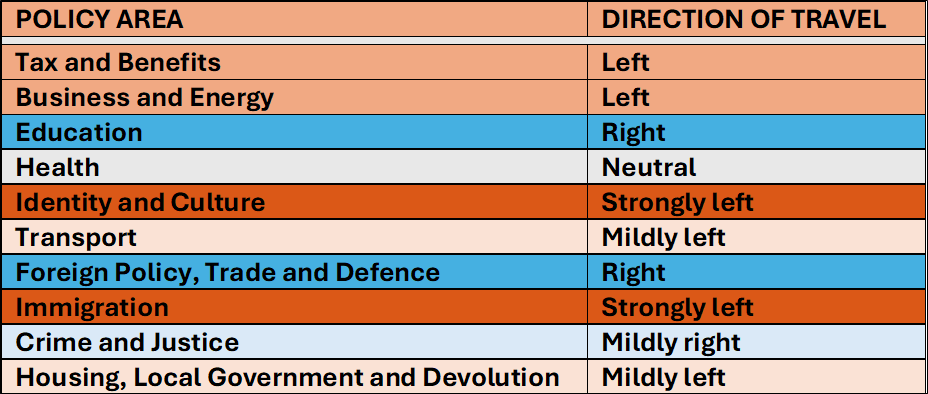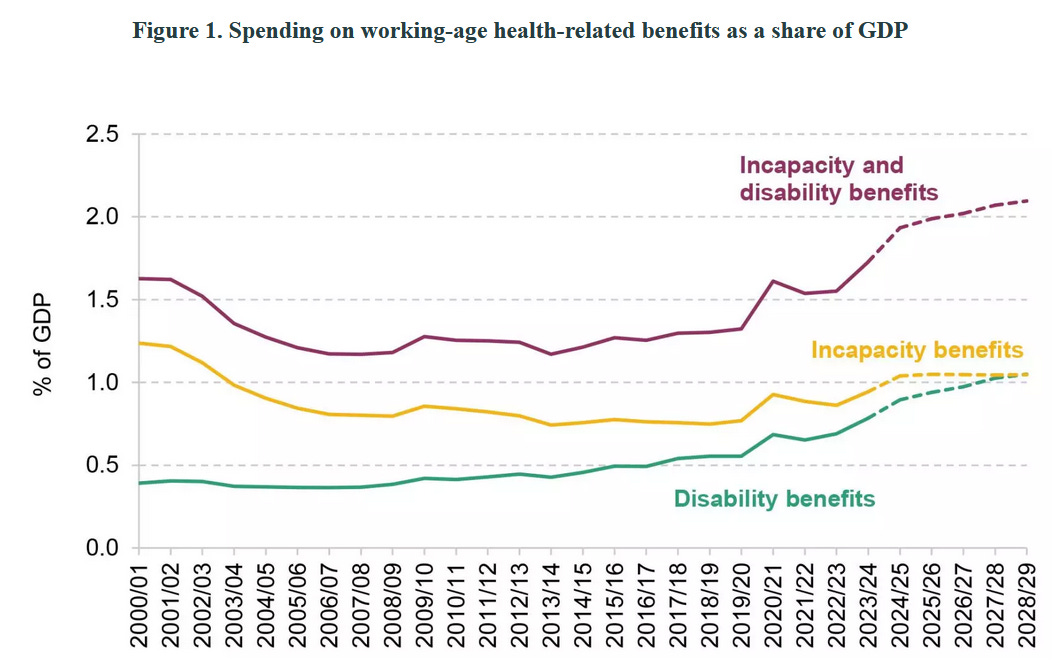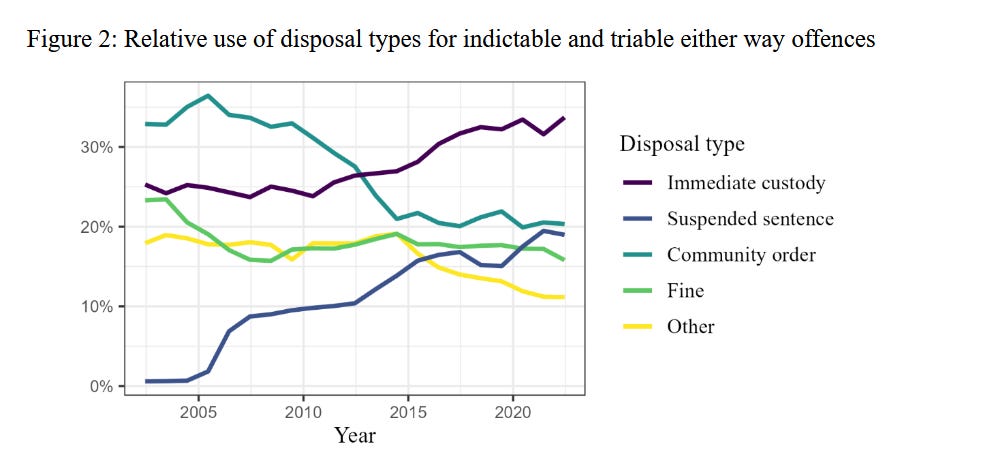To Veer to the Right or to Veer to the Left?
Has Britain shifted right or left over the last two decades?
I’ve written before about why both right and left both frequently feel as if they are fighting the long defeat. But who, actually, is correct? Which way has Britain moved in the last two decades?
In this post I will be systematically assessing changes, broken down by ten major policy areas from tax and benefits to education to immigration, to assess whether each has moved to the right or the left over the time period. We all tend to remember the changes we are upset about - and to bank the gains we win. But which way, in reality, has the country moved?
In most areas, the direction of travel over the last 20 years has been to the left, particularly on tax, identity and culture, immigration and on business and energy. The exceptions are on education and on foreign policy - the latter primarily due to Brexit - and, to a smaller extent, on crime and justice. It has not been a one-way direction of travel - there have been ebbs and flows along the way - but the overall trend has definitively been to the left.
A note on methodology
I have looked at the time period from the 2005 General Election to now (or the latest data available). Where things have changed back and forth over this period, I’ve compared the beginning with now (for example, if a tax had been increased, but then decreased back to the level in 2005, I’d class that as no change).
I have coded non-economic issues in the way they are currently generally coded in Britain1 - for example cutting immigration and Brexit are both counted as being on the right2. Yes, it’s true that a single axis is an imperfect tool and it’s great fun to discuss other axes3, but we’ll be sticking to the standard classifications here. In practice, culture issues such as crime, immigration and identity have been just as important as economics in politics over this period.
It will obviously not be possible every policy change over twenty years, so I’ll be detailing the ones that I consider most significant.4 In determining whether an area has moved to the right or the left I have tried to be objective as possible in considering both the number, and the significance, of those on each side, rather than simply adding up the number of statements.
I would emphasise that this is not an assessment of political parties. I am not interested in whether a change was introduced by the Conservatives or Labour; I am interested in whether it moved the country right or left. Nor am I in any way assessing whether any party, or Prime Minister, did ‘a good job’.
Finally, although I am myself on the right, do not assume that I automatically agree with all of the changes coded right - or that I disagree with all those coded left.5
Tax, and Benefits
Moved to the right
Means-testing of child benefit and of winter fuel allowance6.
Retirement age increased and public sector pension reform.
Moved to the left
Highest tax rate increased from 40% to 45% and personal allowance withdrawn for those earning over £100,000 a year.7
Tax as a share of GDP has increased by almost 10%, from 33.4% to 36.4%. Spending has similarly increased.
VAT increased from 17.5% to 20%.
Debt as a share of GDP has increased from c. 35% to c. 95%.
A significant increase in the share of GDP spent on disability and incapacity benefits.8
An almost doubling of the number claiming out of work benefits.9
Other observations
The unemployment rate has fluctuated, but both now and in 2005 it is between 4% and 5%.10
The overall policy framework for tackling inflation, with the independence of the Bank of England, has remained constant
Benefits policy did move sharply right in the early 2010s, but has since shifted back to be more generous than it was in 2005.
Conclusion: Moved Left.11
Business and Energy
Moved to the right
Anti-strike legislation introduced, requiring minimum turnout levels for strikes to be valid.
Introduction of fees for employment tribunals.
Trade union members now have to actively opt-in to paying into political funds.
Extended time required to claim unfair dismissal from 1 year to 2 years (with some exceptions).12
Moved to the left
Minimum wage has increased from £5.05 an hour in 2005 to £11.44 an hour (c. 30% higher in real terms).
Major increase in financial regulation after the financial crisis.
Significant growth in HR.
Broad increase in business regulations across most sectors over period; burden of regulation increased, head count at major regulators increased13.
Shared parental leave introduced.
Major support for renewable energy generation; UK electricity generation from renewables increased from under 5% to over 40%.14
Other observations
We have consistently failed to build more nuclear power stations.
Conclusion: Moved Left
Education
Moved to the right
Academy freedoms, free schools and greater parental choice.
More rigorous knowledge-rich curriculum, exams replace most coursework
Greater focus on behaviour
Tuition fees trebled
Number controls removed from universities15
Education Maintenance Allowance abolished.
Moved to the left
Government support for childcare increased significantly to c. £8bn a year, with 30 hours of free child care.
Major increase in spending on Special Education Needs and Disability funding, and much greater accommodation of ‘adjustments’ in class and exams (1/3 of children now get extra time in exams).
Minor reduction in parental rights (removal of opt-out for relationship education, greater restrictions on home educating).
Other observations
Further Education budget cut and number of apprenticeships declined.
Conclusion: Moved Right.16
Health
Moved to the right
Small but steady increase of ‘contracting out’ to private providers.
Harder to see an NHS dentist.
Moved to the left
Slight increase in real terms spending on social care.
Significant increase in destigmatisation, diagnoses and NHS spend on mental health.
Smoking banned in public places; significant increase in taxes on cigarettes and alcohol; soft drinks levy.
Other observations
NHS Budget in 2005 and 2025 are similar when measured as a share of GDP, though this - and performance - have fluctuated.17
There have been significant reorganisations in how the NHS is run - such as the creation of NHS trusts or of NHS England - but it is difficult to see that this is either right- or left- coded.
Conclusion: Neutral
Identity and Culture
Moved to the right
Teen pregnancies fall by more than half.
Moved to the left
Equality Act passed.
Same-sex marriage legalised.
#MeToo movement.
BLM movement, statue topplings, renaming of some institutions / roads.
‘Decolonising the curriculum’ mainstreamed in almost all universities and many schools and museums.
Steady fall in the proportion of adults who are married.
Colour-blind casting increasingly common.
Trans rights movement increased greatly, trans and gender issues mainstreamed in schools, public sector and corporate life.18
Significant increase in number of people identifying as LGBT.
Greater controversy over historic British figures.19
Major increase in ‘Equity, Diversity and Inclusion’ related activities, schemes and networks in the corporate and public sector.
Other observations
None.
Conclusion: Moved Strongly Left
Transport
Moved to the right
Bus routes cut by approximately half.
Moved to the left
Increase in low traffic neighbourhoods / low emission zones and cycling routes and schemes.
Increase in electric car ownership and chargers20.
Small number of trainlines nationalised.
Air passenger duty increased.
Other observations
None.
Conclusion: Moved Mildly Left
Foreign Policy, Trade and Defence
Moved to the right
Brexit
A small number of additional free trade agreements have been signed.
Moved to the left
UK has become somewhat more sceptical of foreign intervention (e.g. Parliament voting to stay out of Syria in 2013; no major foreign interventions since Iraq).
Other observations
Overall, the UK’s foreign policy stance has been relatively stable since 2005, with a broadly similar set of allies and adversaries.
The UK has been a strong supporter of Ukraine, which enjoys consistent support across parties and in the general population.
Aid rose from c. 0.5% of GDP to 0.7% of GDP, before recently falling to 0.5% again. It is due to fall further, to 0.3%.21
Defence spending has fluctuated: in real terms, it rose to 2009, fell from then to 2016, and has since been rising again - but is now similar in real terms to 2005.
Conclusion: Moved Right
Immigration
Moved to the right
More restrictive rules in some areas of immigration, for example to bring a foreign-born spouse to the UK.
Moved to the left
Net migration increased from 185k to 741k.
Large scale uncontrolled illegal migration across the Channel (36,816 in 2024).
Total number of international students approximately doubled.
Fall in enforced returns (‘deportations’).22
Various cases that have made it more difficult to deport foreign criminals.23
Other observations
There have been certain points over the period where this did move right - for example the ‘hostile environment’ period, but at the current point we have shifted strongly to the left.
While it may be tempting to raise the Rwanda plan as an example of the country shifting right, it is worth noting that the total number of people sent to Rwanda was an integer between -1 and 1 - and that both net migration and illegal migration increased significantly during the period in which it was being discussed.
Conclusion: Moved Strongly Left
Crime, Justice and Security
Moved to the right
Creation of Police and Crime Commissioners.
Prevent Duty introduced.
Increase in use of custodial sentences and reduction in community service.24 Average sentences have got longer.25
Moved to the left
Shift in police focus towards hate crime, online hate crime and ‘non-crime hate incidents’.
Reduction in number of police officers on the streets.
Other observations
Imprisoned population per head of the population is similar now to in 2005.
Overall crime has fallen over this period, as measured by the Crime Survey in England and Wales. However this does not include various crimes, including crimes against business (such as shoplifting), and some of these have risen significantly over the last ten years. Overall though, it seems likely crime is lower now than in 2005.
Conclusion: Moved Mildly Right
Housing, Local Government and Devolution
Moved to the right
UK Internal Markets Act passed.
Slight fall in total volume of council housing stock.
Moved to the left
Two Scotland Acts and two Wales Acts increased devolved powers.
Increasing proportions of local authority spending spend on SEND and on adult social care.
Other observations
House building has lagged demand throughout all of this period.
There has been significant devolution to Metro Mayors.
Council tax is at a similar level in real terms to 2005.
Conclusion: Moved Mildly Left
Summary
Overall, in most areas other than education and foreign policy (the latter primarily due to Brexit), the direction of travel over the last 20 years has been to the left, particularly on tax, identity and culture, immigration and on business and energy. It has not been a one-way direction of travel: there have been ebbs and flows, and some rightward policies and changes within the mix - but the overall trend is unmistakeable.
Why does this matter? Most fundamentally, it is interesting to look systematically at what has moved in which direction. But beyond that, for those on the left, even if they are not satisfied with everything in the country, it may be helpful to see how much has changed in a way they see positive. For those on the right, it is salutory to reflect on why fourteen years of a Conservative Government26 left the country further to the left than when it began - and, particularly for those involved in politics or public policy, what they might hope would be done differently in future. And for those on either side, perspective on current changes - be they seen as good or bad - can never hurt.
If you’ve not yet taken my survey ‘The Professions of Good and Evil’ - asking people to rate which jobs, if any, they think are morally virtuous or reprehensible, go take it now.
This post was voted for by paid subscribers (thank you!) as the piece they wanted me to write in the third quarter of this year.
Every quarter I ask paid subscribers to vote on a ‘long-read’ that they would like me to write for the next quarter. If you want to be able to vote on what should be the final quarter’s piece, I will be sending out the voting form to paid subscribers next weekend, so upgrade now to have your say.
In addition to voting on the topic, if you wish to be able to propose topics for the vote, then you can become a ‘founding’ subscriber, to gain this both ability and my eternal gratitude.
And the US.
Even if one can argue that the right ‘should’ be in favour of open borders or observe that 50 years ago the right tended to be more pro-EU than the left.
And maybe we’ll do that another day.
Of course, if I’ve omitted any that you consider make a material difference, do have your say in the comments!
For example, I support the increase in minimum wage and I oppose the marketisation (fee rises and number control removal) in higher education.
I personally think the right should oppose means testing. But it is undeniably more associated with the right than the left.
Resulting in an effective marginal tax rate of 60% for those earning between £100k and £125k. Regardless of what you think the rate of tax should be, there is essentially no justification of taxing people earning between £100k - £125k at a higher rate than those earning over £125k.
This has fluctuated over the period, increasing during the financial crisis, then falling significantly, and recently rising sharply again:
Other forms of incapacity benefit may be flattering this figure - but I have addressed this in the point on benefits.
Although moves to the left overwhelming predominate, I have classed this as Left, not Strongly Left, as they are all quite small, and only collectively become large. There has been no jump in the higher rate to 60% or 80%, for example.
See, for example, the regular reports of the Regulatory Policy Committee which should a multi-billion pound increase in burden in most years.
There is strong support on the right for tackling climate change and subsidies and other mechanisms (e.g. feed in tariffs) have been consistently supported by all three major parties. But in so far as it is left- or right- coded it is clearly left-coded, with more left-wing parties and campaigners prioritising greater efforts to tackle climate change.
Currently, the Conservative Party is more sceptical of this, and of the need for more HE overall. But I think this change - as distinct from how many people should go - should be categorised as on the right, as (particularly with fees) it creates more of a marketised system, albeit still an imperfect market.
Although there are a number of items in both right and left here, the overall assessment is ’right’ as the almost complete overhaul of the school system, and major changes to the university, are noticeably more significant.
There has been a small movement back recently, but nowhere near back to the status quo in 2005.
For example, in 2002 (admittedly 3 years before 2005), Winston Churchill was nominated for a BBC ‘Greatest Briton of All Time’ poll by a Labour Cabinet Minister and won decisively. It is unlikely that this would happen now, with only 1/5 of 18-24 year-olds saying they view him positively.
See note on Business and Energy.
Which would be classed as a move to the right if it had happened yet.
For example, AM (Zimbabwe) (2020) in which the Supreme Court blocked the deportation of an HIV-positive foreign criminal because of the inadequate health service in Zimbabwe, or a more recent case where a court ruled a sex offender could not be deported to Afghanistan because he might be persecuted there for being a sex offender.
This is partly caused by short (less than one year) sentences being given less often, which drives up the average prison sentence. However, average sentences for specific crimes (e.g. knife crime, manslaughter) have also got longer.
OK, five years of a Conservative-Liberal Democrat coalition and nine years of Conservative Government.










Regardless of the rest of the article, I just wanted to say that I appreciated the F&S reference. You don't many of those any more.
Some long covid (including a lot of depression / mystery ailments / people being pushed over the threshold of not being able to work that isn't recorded as long covid), some NHS crisis (partly downsteam of covid including employee burnout, partly aging population, partly overseas workers leaving due to the hostile environment) which could maybe be policy caused but would be right wing policy if it was, some social care crisis (which is kind of right wing policy to reduce council funding but is mostly just aging population, decreasing family care, and cost disease on carers).
I think it has got mildly easier to get a job while disabled, but this is now going back down again now people are doing return to office more throughly.